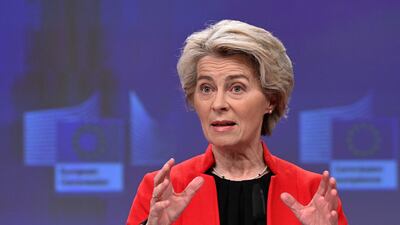Allegations of corruption against the Vice President of the European Parliament are of the “utmost concern” and “very serious,” said European Commission President Ursula von der Leyen on Monday.
“It is a question of confidence of people in our institutions,” she said, reiterating that she was also proposing the creation of an independent ethics body to cover EU institutions including the European Parliament, the European Central Bank and the European Court of Justice.
A Belgian judge charged four people on Sunday for allegedly receiving money and gifts to influence decisions in the European Parliament, accusations that have caused consternation in Brussels.
Six people were initially detained. Four have been charged and two released, prosecutors said in a statement. They did not name any of those involved.
European Parliament Vice President Eva Kaili, a former television presenter, is reportedly among those who remain detained. Greek authorities on Monday froze her assets.
The measure, which also applies to her relatives, includes “bank accounts, safes, companies and other financial assets”, said the chief of the Greek anti-money laundering authority, Haralambos Vourliotis.
Ms Kaili has also been stripped of her responsibilities as a Vice President of the Parliament, notably that of representing Parliament President Roberta Metsola in the Middle East.
The EU’s top diplomat Josep Borrell on Monday described the charges as “very worrisome.”
“This is an unbelievable incident which has to be cleared up completely with the full force of law,” German Foreign Minister Annalena Baerbock said, as she arrived for a regular meeting with her EU counterparts in Brussels. “This is about the credibility of Europe.”
Prosecutors searched 16 houses and seized 600,000 euros ($631,800) in Brussels on Friday as part of an investigation into money laundering and corruption.
Belgian prosecutors said they had suspected for months that a Gulf state was trying to influence decisions in Brussels. A source said the state was Qatar, but Qatar's mission to the EU issued a statement denying the accusations.
“Any association of the Qatari government with the reported claims is baseless and gravely misinformed,” it said, adding that Qatar worked through institution-to-institution engagement and in full compliance with international laws.
The European Parliament was due to vote this week on a proposal to extend visa-free travel to the EU for Kuwait, Qatar, Oman and Ecuador.
Speaking at a plenary session in Strasburg, European Parliament President Roberta on Monday said the negotiating mandate for the visa waiver report with Qatar and Kuwait would be sent back to committee "in light of the investigations."
Parliament's Committee on Civil Liberties, Justice and Home Affairs had recently approved the visa waiver for Qatar, but the decision needed to be greenlighted in a plenary session.

